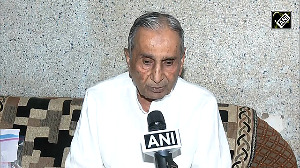A man should have a livelihood," Vijay Krishniah says to me, turning around full square to be sure I receive the full import of his words. The van ahead of us is scarily close, but this does not appear to worry him much. He's trying to explain to me how he came to be an auto-rickshaw driver, his expression an odd mixture of defiant pride and bitterness.
In Davangere he was a fertilizer trader, fronting rather large sums of money to farmers and earning his returns post-harvest. One collapsed season forced him down several economic classes, and minus 15+ lakhs of his money, Krishniah has been forced into a new life. His long-disposed personal car has left him with a useful legacy -- the knowledge of driving -- and he now makes his living on Bangalore's broader avenues. His dignity will not afford this alternate trade in Davangere itself, and so leaving their young children with grandparents the Krishniahs have begun a second life, far from their home of four decades.
This is the latest of my auto-rickshaw encounters but in many respects the most revealing one. We talk about his earnings, savings, plans to purchase his own vehicle, hopes to return to his home and regain his fertilizer trade. In between I must kill a couple of hours while an upscale retailer will finish fitting my new pair of pants, so we even have the opportunity to eat dinner together. His is an unfamiliar story, different from the many others I have heard from his fellow drivers; unlike the majority who see their vehicles as the carriers of better fortunes, Krishniah must live with the demons of his failure as well.
Mostly I simply listen, understanding what little I can of his condition, holding both sympathy and encouragement in reserve. But every recent conversation I have had with the auto drivers has begun with the intention to ask a very specific question, and eventually I muster the courage to pose this. "I hope you will not mind if I ask you something," I begin, yet anticipating his waving away my hesitation; hardly anyone tells me not to ask the question, and my caution is but social grace.
"Do you think of yourself as middle class, or poor?"
He doesn't hesitate. "Middle class, certainly. At least we have a roof over our head, we eat three meals, our children go to school, our family is intact, and we have some reliable means for a livelihood, however meager. So many others don't have even these."
The uniformity of this response has been an extraordinarily revealing experience for me. Every auto driver I speak with is certain that he belongs to the middle class. There is a little spread in their incomes depending on ownership of the vehicles they ply -- those who own their machines can expect to take home nearer to Rs 5,000 in Bangalore or Chennai whereas those who rent will earn about a third less, after all expenses on the vehicle are accounted for. They all live in various stages of indebtedness, usually paying 100% or more in interest for the same activities we carry over on our credit cards at a fifth or less of the rate. Some -- like Venu, another driver I talked to at length -- have sunk invaluable monies into dubious chit funds in the hope of payoffs, and lost even the amounts they have saved in that process. But without variation, each believes he is "middle class."
Perhaps some of this can be explained away as a reluctance to be labeled poor, but much of it is certainly an appreciation of their relative affluence within the ocean of deprivation. Contrast this with a different observation -- countless numbers of people with far higher incomes than the Venus and Krishniahs of the world also refer to themselves by the same term! "Middle class families like ours" is an expression that is heard often among higher income groups in more than one context.
Surely the two worlds are not the same? We must ask both sides of the same question -- what makes any family middle class, and by the same measures, who else would occupy similar status? The answers can alter much of what we believe about our own economic status and those of others, and I urge you to try a little calculation of your own. Write down a figure that you believe constitutes the mid-point of "middle class income," and also answer an additional question -- namely, how different can one's income be from this figure and still be considered middle class? Considering our own incomes in light of such standards can be telling.
Some weeks ago, my sister-in-law undertook this simple exercise, which went part way towards finding the answers. Using published data on the nation's Gross Domestic Product and population figures along with a reasonable assumption on income disparity, one can make back-of-the-envelope calculations of the median income, as well as the percentage of people whose incomes exceed a particular figure. These aren't necessarily spot on, for various reasons, but such an estimate can be instructive. By this exercise she arrived at an unexpected conclusion, and each time I have repeated this finding to someone I find him or her surprised as well.
The auto-rickshaw driver sits squarely in the middle of the nation's economic indicators.
As elsewhere in the world, in India too discussions of national prosperity are to be found disproportionately among the higher economic classes. Since the news is largely profit-driven, only those portions of it that can be sold profitably find significant space. In a highly unregulated economy, the informal activities of the poorest are often invisible to the decision-makers. The result is a biased understanding of socio-economic conditions, sometimes deliberate and sometimes unwitting. Nearly every family that can access these pages earns at least four to five times the median income, and given the disparities of earnings, often even more. But this reality of the poverty of the millions lies unseen behind a curtain of ignorance and neglect.
Are we wealthy, middle class, or poor? How far above the median are we? An honest acceptance of the answers is the first step towards broad national prosperity. Our material needs and wants lead us inevitably to believe that we ourselves live with less than the desired amounts of wealth. But this defeats a proper understanding of those who must exist with far less. In their world, the economic indices we see only as statistical entities define the boundaries of their aspirations, and limit the fullness of their participation in our democracy.






 © 2025
© 2025